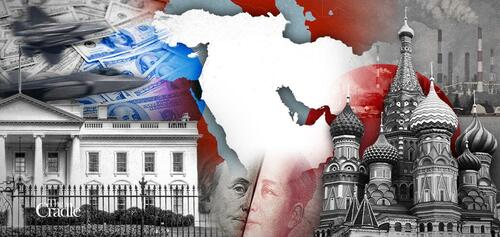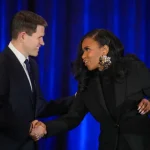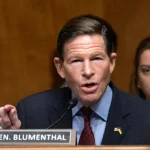
Authored by Pepe Escobar via The Cradle,
At Russia's Valdai Club meeting - the east's answer to Davos - intellectuals and influencers gathered to frame West Asia's current and future developments...
The 12th “Middle East Conference” at the Valdai Club in Moscow offered a more than welcome cornucopia of views on interconnected troubles and tribulations affecting the region.
But first, an important word on terminology – as only one of Valdai’s guests took the trouble to stress. This is not the “Middle East” – a reductionist, Orientalist notion devised by old colonials: at The Cradle we emphasize the region must be correctly described as West Asia.
Some of the region’s trials and tribulations have been mapped by the official Valdai report, The Middle East and The Future of Polycentric World. But the intellectual and political clout of those in attendance can provide valuable anecdotal insights too. Here are a few of the major strands participants highlighted on regional developments, current and future:
Russian Deputy Foreign Minister Mikhail Bogdanov set the stage by stressing that Kremlin policy encourages the formation of an “inclusive regional security system.” That’s exactly what the Americans refused to discuss with the Russians in December 2021, then applied to Europe and the post-Soviet space. The result was a proxy war.
Kayhan Barzegar of Islamic Azad University in Iran qualified the two major strategic developments affecting West Asia: a possible US retreat and a message to regional allies: “You cannot count on our security guarantees.”
Every vector – from rivalry in the South Caucasus to the Israeli normalization with the Persian Gulf – is subordinated to this logic, notes Barzegar, with quite a few Arab actors finally understanding that there now exists a margin of maneuver to choose between the western or the non-western bloc.
Barzegar does not identify Iran-Russia ties as a strategic alliance, but rather a geopolitical, economic bloc based on technology and regional supply chains – a “new algorithm in politics” – ranging from weapons deals to nuclear and energy cooperation, driven by Moscow’s revived southern and eastward orientations. And as far as Iran-western relations go, Barzegar still believes the Joint Comprehensive Plan of Action (JCPOA), or Iran nuclear deal, is not dead. A least not yet.
‘Nobody knows what these rules are’
Egyptian Ramzy Ramzy, until 2019 the UN Deputy Special Envoy for Syria, considers the reactivation of relations between Egypt, Saudi Arabia, and the UAE with Syria as the most important realignment underway in the region. Not to mention prospects for a Damascus-Ankara reconciliation. “Why is this happening? Because of the regional security system’s dissatisfaction with the present,” Ramzy explains.
Yet even if the US may be drifting away, “neither Russia nor China are willing to take up a leadership role,” he says. At the same time, Syria “cannot be allowed to fall prey to outside interventions. The earthquake at least accelerated these rapprochements.”
Bouthaina Shaaban, a special advisor to Syrian President Bashar al-Assad, is a remarkable woman, fiery and candid. Her presence at Valdai was nothing short of electric. She stressed how “since the US war in Vietnam, we lost what we witnessed as free media. The free press has died.” At the same time “the colonial west changed its methods,” subcontracting wars and relying on local fifth columnists.
Shaaban volunteered the best short definition anywhere of the “rules-based international order”: “Nobody knows what these rules are, and what this order is.”
She re-emphasized that in this post-globalization period that is ushering in regional blocs, the usual western meddlers prefer to use non-state actors – as in Syria and Iran – “mandating locals to do what the US would like to do.”
A crucial example is the US al-Tanf military base that occupies sovereign Syrian territory on two critical borders. Shaaban calls the establishment of this base as “strategic, for the US to prevent regional cooperation, at the Iraq, Jordan, and Syria crossroads.” Washington knows full well what it is doing: unhampered trade and transportation at the Syria-Iraq border is a major lifeline for the Syrian economy.
Reminding everyone once again that “all political issues are connected to Palestine,” Shaaban also offered a healthy dose of gloomy realism: “The eastern bloc has not been able to match the western narrative.”
A ‘double-layered proxy war’
Cagri Erhan, rector of Altinbas University in Turkey, offered a quite handy definition of a Hegemon: the one who controls the lingua franca, the currency, the legal setting, and the trade routes.
Erhan qualifies the current western hegemonic state of play as “double-layered proxy war” against, of course, Russia and China. The Russians have been defined by the US as an “open enemy” – a major threat. And when it comes to West Asia, proxy war still rules: “So the US is not retreating,” says Erhan. Washington will always consider using the area “strategically against emerging powers.”
Then what about the foreign policy priorities of key West Asian and North African actors?
Algerian political journalist Akram Kharief, editor of the online MenaDefense, insists Russia should get closer to Algeria, “which is still in the French sphere of influence,” and be wary of how the Americans are trying to portray Moscow as “a new imperial threat to Africa.”
Professor Hasan Unal of Maltepe University in Turkiye made it quite clear how Ankara finally “got rid of its Middle East [West Asian] entanglements,” when it was previously “turning against everybody.”
Mid-sized powers such as Turkiye, Iran, and Saudi Arabia are now stepping to the forefront of the region’s political stage. Unal notes how “Turkiye and the US don’t see eye to eye on any issue important to Ankara.” Which certainly explains the strengthening of Turkish-Russian ties – and their mutual interest in introducing “multi-faceted solutions” to the region’s problems.
For one, Russia is actively mediating Turkiye-Syria rapprochement. Unal confirmed that the Syrian and Turkish foreign ministers will soon meet in person – in Moscow – which will represent the highest-ranking direct engagement between the two nations since the onset of the Syrian war. And that will pave the way for a tripartite summit between Assad, Russian President Vladimir Putin and his Turkish counterpart Recep Tayyip Erdogan.
Note that the big regional reconciliations are being held – once again – either in, or with the participation of Moscow, which can rightfully be described as the capital of the 21st century multipolar world.
When it comes to Cyprus, Unal notes how “Russia would not be interested in a unified state that would be EU and NATO territory.” So it’s time for “creative ideas: as Turkey is changing its Syria policy, Russia should change its Cyprus policy.”
Dr. Gong Jiong, from the Israeli campus of China’s University of International Business and Economics, came up with a catchy neologism: the “coalition of the unwilling” – describing how “almost the whole Global South is not supporting sanctions on Russia,” and certainly none of the players in West Asia.
Gong noted that as much as China-Russia trade is rising fast – partly as a direct consequence of western sanctions – the Americans would have to think twice about China-hit sanctions. Russia-China trade stands at $200 billion a year, after all, while US-China trade is a whopping $700 billion per annum.
The pressure on the “neutrality camp” won’t relent anyway. What is needed by the world’s “silent majority,” as Gong defines it, is “an alliance.” He describes the 12-point Chinese peace plan for Ukraine as “a set of principles” – Beijing’s base for serious negotiations: “This is the first step.”
There will be no new Yalta
What the Valdai debates made crystal clear, once again, is how Russia is the only actor capable of approaching every player across West Asia, and be listened to carefully and respectfully.
It was left to Anwar Abdul-Hadi, director of the political department of the Palestine Liberation Organization (PLO) and the latter’s official envoy to Damascus, to arguably sum up what led to the current global geopolitical predicament: “A new Yalta or a new world war? They [the west] chose war.”
And still, as new geopolitical and geoeconomic fault lines keep emerging, it is as though West Asia is anticipating something “big” coming ahead. That feeling was palpable in the air at Valdai.
To paraphrase Yeats, and updating him to the young, turbulent 21st century, “what rough beast, its hour come out at last, slouches towards the cradle [of civilization] to be born?
Authored by Pepe Escobar via The Cradle,
At Russia’s Valdai Club meeting – the east’s answer to Davos – intellectuals and influencers gathered to frame West Asia’s current and future developments…
The 12th “Middle East Conference” at the Valdai Club in Moscow offered a more than welcome cornucopia of views on interconnected troubles and tribulations affecting the region.
But first, an important word on terminology – as only one of Valdai’s guests took the trouble to stress. This is not the “Middle East” – a reductionist, Orientalist notion devised by old colonials: at The Cradle we emphasize the region must be correctly described as West Asia.
Some of the region’s trials and tribulations have been mapped by the official Valdai report, The Middle East and The Future of Polycentric World. But the intellectual and political clout of those in attendance can provide valuable anecdotal insights too. Here are a few of the major strands participants highlighted on regional developments, current and future:
Russian Deputy Foreign Minister Mikhail Bogdanov set the stage by stressing that Kremlin policy encourages the formation of an “inclusive regional security system.” That’s exactly what the Americans refused to discuss with the Russians in December 2021, then applied to Europe and the post-Soviet space. The result was a proxy war.
Kayhan Barzegar of Islamic Azad University in Iran qualified the two major strategic developments affecting West Asia: a possible US retreat and a message to regional allies: “You cannot count on our security guarantees.”
Every vector – from rivalry in the South Caucasus to the Israeli normalization with the Persian Gulf – is subordinated to this logic, notes Barzegar, with quite a few Arab actors finally understanding that there now exists a margin of maneuver to choose between the western or the non-western bloc.
Barzegar does not identify Iran-Russia ties as a strategic alliance, but rather a geopolitical, economic bloc based on technology and regional supply chains – a “new algorithm in politics” – ranging from weapons deals to nuclear and energy cooperation, driven by Moscow’s revived southern and eastward orientations. And as far as Iran-western relations go, Barzegar still believes the Joint Comprehensive Plan of Action (JCPOA), or Iran nuclear deal, is not dead. A least not yet.
‘Nobody knows what these rules are’
Egyptian Ramzy Ramzy, until 2019 the UN Deputy Special Envoy for Syria, considers the reactivation of relations between Egypt, Saudi Arabia, and the UAE with Syria as the most important realignment underway in the region. Not to mention prospects for a Damascus-Ankara reconciliation. “Why is this happening? Because of the regional security system’s dissatisfaction with the present,” Ramzy explains.
Yet even if the US may be drifting away, “neither Russia nor China are willing to take up a leadership role,” he says. At the same time, Syria “cannot be allowed to fall prey to outside interventions. The earthquake at least accelerated these rapprochements.”
Bouthaina Shaaban, a special advisor to Syrian President Bashar al-Assad, is a remarkable woman, fiery and candid. Her presence at Valdai was nothing short of electric. She stressed how “since the US war in Vietnam, we lost what we witnessed as free media. The free press has died.” At the same time “the colonial west changed its methods,” subcontracting wars and relying on local fifth columnists.
Shaaban volunteered the best short definition anywhere of the “rules-based international order”: “Nobody knows what these rules are, and what this order is.”
She re-emphasized that in this post-globalization period that is ushering in regional blocs, the usual western meddlers prefer to use non-state actors – as in Syria and Iran – “mandating locals to do what the US would like to do.”
A crucial example is the US al-Tanf military base that occupies sovereign Syrian territory on two critical borders. Shaaban calls the establishment of this base as “strategic, for the US to prevent regional cooperation, at the Iraq, Jordan, and Syria crossroads.” Washington knows full well what it is doing: unhampered trade and transportation at the Syria-Iraq border is a major lifeline for the Syrian economy.
Reminding everyone once again that “all political issues are connected to Palestine,” Shaaban also offered a healthy dose of gloomy realism: “The eastern bloc has not been able to match the western narrative.”
A ‘double-layered proxy war’
Cagri Erhan, rector of Altinbas University in Turkey, offered a quite handy definition of a Hegemon: the one who controls the lingua franca, the currency, the legal setting, and the trade routes.
Erhan qualifies the current western hegemonic state of play as “double-layered proxy war” against, of course, Russia and China. The Russians have been defined by the US as an “open enemy” – a major threat. And when it comes to West Asia, proxy war still rules: “So the US is not retreating,” says Erhan. Washington will always consider using the area “strategically against emerging powers.”
Then what about the foreign policy priorities of key West Asian and North African actors?
Algerian political journalist Akram Kharief, editor of the online MenaDefense, insists Russia should get closer to Algeria, “which is still in the French sphere of influence,” and be wary of how the Americans are trying to portray Moscow as “a new imperial threat to Africa.”
Professor Hasan Unal of Maltepe University in Turkiye made it quite clear how Ankara finally “got rid of its Middle East [West Asian] entanglements,” when it was previously “turning against everybody.”
Mid-sized powers such as Turkiye, Iran, and Saudi Arabia are now stepping to the forefront of the region’s political stage. Unal notes how “Turkiye and the US don’t see eye to eye on any issue important to Ankara.” Which certainly explains the strengthening of Turkish-Russian ties – and their mutual interest in introducing “multi-faceted solutions” to the region’s problems.
For one, Russia is actively mediating Turkiye-Syria rapprochement. Unal confirmed that the Syrian and Turkish foreign ministers will soon meet in person – in Moscow – which will represent the highest-ranking direct engagement between the two nations since the onset of the Syrian war. And that will pave the way for a tripartite summit between Assad, Russian President Vladimir Putin and his Turkish counterpart Recep Tayyip Erdogan.
Note that the big regional reconciliations are being held – once again – either in, or with the participation of Moscow, which can rightfully be described as the capital of the 21st century multipolar world.
When it comes to Cyprus, Unal notes how “Russia would not be interested in a unified state that would be EU and NATO territory.” So it’s time for “creative ideas: as Turkey is changing its Syria policy, Russia should change its Cyprus policy.”
Dr. Gong Jiong, from the Israeli campus of China’s University of International Business and Economics, came up with a catchy neologism: the “coalition of the unwilling” – describing how “almost the whole Global South is not supporting sanctions on Russia,” and certainly none of the players in West Asia.
Gong noted that as much as China-Russia trade is rising fast – partly as a direct consequence of western sanctions – the Americans would have to think twice about China-hit sanctions. Russia-China trade stands at $200 billion a year, after all, while US-China trade is a whopping $700 billion per annum.
The pressure on the “neutrality camp” won’t relent anyway. What is needed by the world’s “silent majority,” as Gong defines it, is “an alliance.” He describes the 12-point Chinese peace plan for Ukraine as “a set of principles” – Beijing’s base for serious negotiations: “This is the first step.”
There will be no new Yalta
What the Valdai debates made crystal clear, once again, is how Russia is the only actor capable of approaching every player across West Asia, and be listened to carefully and respectfully.
It was left to Anwar Abdul-Hadi, director of the political department of the Palestine Liberation Organization (PLO) and the latter’s official envoy to Damascus, to arguably sum up what led to the current global geopolitical predicament: “A new Yalta or a new world war? They [the west] chose war.”
And still, as new geopolitical and geoeconomic fault lines keep emerging, it is as though West Asia is anticipating something “big” coming ahead. That feeling was palpable in the air at Valdai.
To paraphrase Yeats, and updating him to the young, turbulent 21st century, “what rough beast, its hour come out at last, slouches towards the cradle [of civilization] to be born?
Loading…






